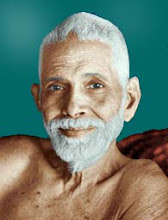Ramana Maharshi on Eight limbs of knowledge, jnana ashtanga
Question : What are the eight limbs of knowledge (jnana ashtanga)?
Ramana Maharshi : The eight limbs are those which have been already mentioned, viz., yama, niyama etc., but differently defined:
(1) Yama: This is controlling the aggregate of sense-organs, realizing the defects that are present in the world consisting of the body, etc.
(2) Niyama: This is maintaining a stream of mental modes that relate to the Self and rejecting the contrary modes. In other words, it means love that arises uninterruptedly for the
Supreme Self.
(3) Asana: That with the help of which constant meditation on Brahman is made possible with ease is asana.
(4) Pranayama: Rechaka (exhalation) is removing the two unreal aspects of name and form from the objects constituting the world, the body etc., puraka (inhalation) is grasping the
three real aspects, existence, consciousness and bliss, which are constant in those objects, and kumbhaka is retaining those aspects thus grasped.
(5) Pratyahara: This is preventing name and form which have been removed from re-entering the mind.
(6) Dharana: This is making the mind stay in the Heart, without straying outward, and realizing that one is the Self itself which is Existence-Consciousness-Bliss.
(7) Dhyana: This is meditation of the form ‘I am only pure consciousness’. That is, after leaving aside the body which consists of five sheaths, one enquires ‘Who am I?’, and as a result of that, one stays as ‘I’ which shines as the Self.
(8) Samadhi: When the ‘I-manifestation’ also ceases, there is (subtle) direct experience. This is samadhi. For pranayama, etc., detailed here, the disciplines such as asana, etc., mentioned in connection with yoga are not necessary. The limbs of knowledge may be practised at all places and at all times. Of yoga and knowledge, one may follow whichever is pleasing to one, or both, according to circumstances. The great teachers say that forgetfulness is the root of all evil, and is death for those who seek release so one should rest the mind in one’s Self and should never forget the Self: this is the aim.
If the mind is controlled, all else can be controlled. The distinction between yoga with eight limbs and knowledge with eight limbs has been set forth elaborately in the sacred texts; so only the substance of this teaching has been given here.
Thursday, December 18, 2008
Subscribe to:
Post Comments (Atom)

No comments:
Post a Comment
Note: Only a member of this blog may post a comment.